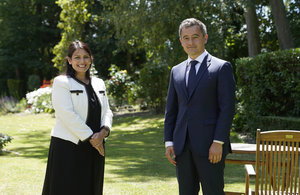Green recovery at the heart of this year’s Bees’ Needs Week
The Defra-coordinated annual Bees’ Needs Week got underway today (Monday 13 July) with an online launch to highlight what everyone can be doing at home to care for pollinators.
Bees and other pollinators play a crucial role in food production and agriculture – they contribute the equivalent of more than £500 million a year to UK agriculture and food production, by improving crop quality and quantity – and are also vital to our wider, natural ecosystems.
The Coronavirus pandemic has provided an opportunity for being in nature, according to Natural England’s People and Nature Survey for England, 60% of adults in England said that they had spent time outside in green and natural spaces in the previous two weeks.
These spaces are vital homes for our insect pollinators, of which there are thousands of species in the UK, including moths and butterflies as well as our beloved honeybees, bumblebees and many solitary bees. But their populations are under threat from risks such as habitat loss and fragmentation, invasive species, pests and disease, climate change and pesticide use.
Through the National Pollinator strategy, we are working with farmers, business and conservation organisations to provide pollinator habitat on farmland, in urban areas and in gardens.
Bees’ Needs Week 2020 will see Defra and many other organisations working together to encourage everyone who can to do simple things at home – like growing more flowers and cutting grass less often – to help our precious pollinators thrive, and to engage further with nature through citizen science initiatives such as the Pollinator Monitoring Scheme’s (PoMS) insect counts.
Defra Minister for pollinators, Rebecca Pow, said:
This year, we have seen an increased appreciation for nature in England in response to the Coronavirus pandemic with the nation building back greener.
Bees’ Needs Week is about celebrating the fact that everyone can get involved by leaving patches of garden to grow wild, growing more flowers, cutting grass less, not disturbing insect nests, and carefully considering how we use pesticides.
Our ambitious Environment and Agriculture Bills will enable us to enhance and protect our precious natural environment and diverse ecosystems, improving habitats for pollinators, for years to come.
Natural England Chair, Tony Juniper, said:
Bees maybe small, but they have a huge impact on how our world works. These wonderful insects are a kind of natural glue, holding the environment together by moving pollen between plants, enabling whole systems to be sustained and replenished. Without bees, we could not live.
Although overall the status of pollinators has declined, the good news is that everyone can do something to help. Many of us have been more connected with Nature during the pandemic lockdown and I very much hope that this newly-found reverence for our environment can be harnessed to ensure pollinators’ habitats, populations and products are protected for the future.
Whether you are a farmer, a gardener, or a land manager, there is something you can do to help support our valuable insect pollinators.
Here are five simple actions you can take to help pollinators and make sure their populations are sustained:
- Grow more flowers, shrubs and trees
- Let your garden grow wild
- Cut your grass less often
- Don’t disturb insect nest and hibernation spots
- Think carefully about whether to use pesticides
Another way people can help is by monitoring your local bee and pollinator populations. Spend 10 minutes in the sun to count insects for the UK’s Pollinator Monitoring Scheme (PoMS), and get involved on social media using #beesneeds.
